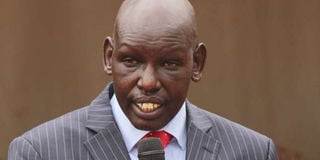Travel ban on academics retrogressive

Education Principal Secretary Belio Kipsang speaks during a requiem mass at Moi Girls School, Nairobi, on September 14, 2017. The ministry has instituted a travel ban on vice-chancellors of public universities and principals of constituent colleges. PHOTO | KANYIRI WAHITO | NATION MEDIA GROUP
What you need to know:
- The academics’ union must intervene to restore the dignity of academic staff or forever risk irrelevance.
- The travel ban offends the autonomy that universities should ordinarily enjoy.
For two weeks now, academics cannot leave the country for any reason.
This follows a September 20 circular by the Education Principal Secretary to vice-chancellors of public universities and principals of constituent colleges.
“It has been decided, until further advised otherwise, no government official will travel outside the country,” the PS wrote.
“Please bring the contents of this letter to all staff working under your institutions.”
DEMOCRACY
The import of the government directive is that no academic can attend an international conference or workshop or even take his family on holiday in, say, Zanzibar, until further notice.
Sadly, the circular raises serious questions on our purported claims of being a constitutional democracy and has, in a single stroke, put us in the same league with dysfunctional, dictatorial states.
This is unprecedented. Even in the dark days of Kanu rule, imposition of Executive power on universities did not get to the point of banning travel.
FREEDOMS
For a country that is glowing in the limelight in Africa for its progressive constitution, recently demonstrated by a landmark ruling at the Judiciary, the decree was a gigantic step back to the dark ages, which most assumed were behind us.
The order is unconstitutional. Chapter 4 of the Bill of Rights, in Article 39 of the Constitution, explicitly gives every Kenyan the right to freedom of movement, and specifically the rights to leave and enter Kenya.
These rights have now been withdrawn.
OPPRESSION
The directive is as confusing as it is misplaced. The government has provided no substantial reason to warrant this illegality.
Kenya is not at war and the government itself, through the Attorney-General, has publicly confirmed that there is no political crisis or leadership vacuum.
Owing to the numerous cancellations of key speaking engagements by Kenyan scholars, our country is receiving negative publicity.
Our heads, long held high in pride when abroad, are now bent over, drooped in indignity.
We do not know whether to describe this as a bad dream or a sign of creeping authoritarianism.
SCHOLARSHIP
The government has deprived itself of badly needed cultural diplomatic agency, especially at a peculiar point in its political history, by imposing a ban on people who often act as ambassadors.
Indeed, if the move was meant to diffuse the perceived internal political stalemate, it has only attracted more global attention to it.
Are we saying that research has actually stopped?
But knowledge has no borders, and distinguished scholarship is that which has been reviewed by peers internationally.
Many scholars are engaged in international assignments that, among others, entails teaching and visiting fellowships, external examinations, exchange programmes and international collaboration.
TRADE UNION
Most of these partnerships are subject to agreements that pool hundreds of millions of shillings for the benefit of this country.
And what does the ban suggest of the University Academic Staff Union (Uasu)?
The union has not even issued a statement. One would have expected a prompt court intervention.
The academics’ union must intervene to restore the dignity of academic staff or forever risk irrelevance.
The travel ban offends the autonomy that universities should ordinarily enjoy.
ILLEGAL
It has also undermined academic freedom.
While the autonomy is an ideal, it is something the government must encourage, both for its own benefit and the university at large.
To impose a travel ban on academics is unreasonable, illegal and thoughtless.
It is anti-intellectual. It is also humiliating. It is in the interest of the government to lift it.
Dr Omanga teaches at Moi University. [email protected].




